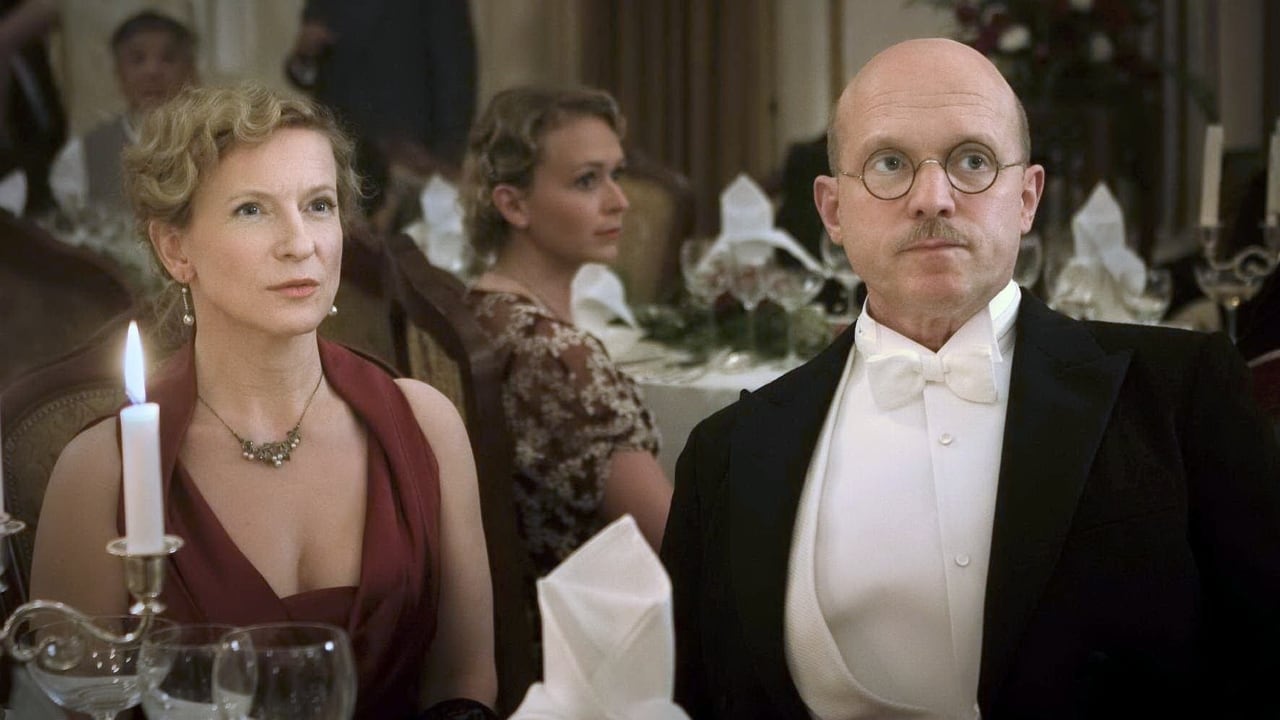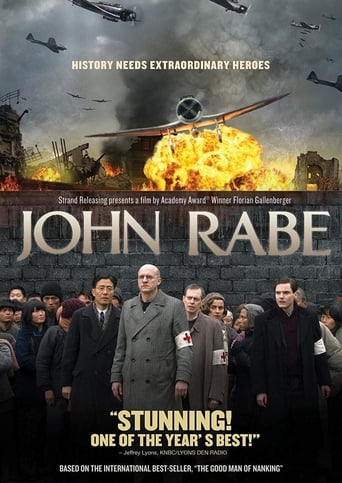



The greatest movie ever made..!
SERIOUSLY. This is what the crap Hollywood still puts out?
View MorePlot so thin, it passes unnoticed.
Masterful Movie
"John Rabe" is a very glossy and well done film about the actions of Rabe and a few other foreigners in saving as many of the residents of Nanking as they could during the Japanese invasion. The airplane attacks and look of the film were absolutely great--and the film is well worth seeing.I am very familiar with the story of John Rabe and used to teach my world history students about him and the Japanese destruction of Nanking (I have since retired). Much of what I'd learned were from the book "The Rape of Nanking" as well as several well made documentaries. So, I am NOT the typical person watching the story for the first time--I am a bit tougher to please. Because of this, I am much more critical that average and to me, the story was flawed because it actually seemed very sanitized. In other words, while the film DID show some of the Japanese atrocities, it didn't do much--probably because it would nauseate most viewers. BUT, by doing so, it minimized the evil that was perpetrated here--making the Japanese troops seem almost normal. It's rare, but I would have included much more blood and talked much more about the rapes and murder of children. Evil must not be minimized and here it just didn't seem as sadistic and wrong as the Rape of Nanking was.
View MoreImpressive visual effects in this story of John Rabe, a German businessman running the Siemens factory in Nanking, China, as the city is first threatened, then occupied and its residents brutalized by the Japanese Army in 1937.Along with a handful of other internationals, Rabe is instrumental in forming a committee to operate the factory as a "safety zone" in which women and children are safe from the invading soldiers. His credentials as a German citizen, a formal ally of Japan, is one of his most important contributions to the task. It works, more or less, but not without suspenseful hitches.Not too much is shown of what the soldiers did to the citizens of Nanking, which is all for the good. Nobody would believe it. Three hundred thousand Chinese died at the time. That would be about half the population of contemporary San Francisco. The Chinese were eliminated wholesale and in a disorganized and whimsical way. Some of the living were used as bayonet practice targets. How does a culture that promotes such delicate arts as bonsai and origami, that is so terribly polite, manage to tolerate such brutality in its military? Nobody knows. The anthropologist Ruth Benedict tried to explain it in terms of the difference between "shame" and "guilt." At any rate, the cast varies in the way it fits the characters. John Rabe is played by Ulrich Tukur, the nominal hero, and he couldn't be a better choice -- distant, formal, and yet as mousy as Donald Pleasance with a mustache would have been. Anne Consigny as the French school mistress is strikingly beautiful and gives a fine performance. Steve Buscemi is, at first, the undiplomatically brash American doctor who hates Rabe for his Teutonic background but eventually learns to respect and admire him. Buscemi doesn't seem to belong. With his pale face, bulging eyeballs, and shark-like incisors, he looks more like Dracula than a doctor, and he sounds as if he just ran away from a Quentin Tarantino set.In a way it's a formula movie, rather like "Schindler's List", the kind of movie that wins awards. For the most part, the good guys are attractive and the bad guys are ugly. A handful of high-status types band together at the risk of their own lives to save several thousand Chinese. Certain select Japanese officers are clearly the villains but there's even a "good Japanese" who passes on warnings in an attempt to prevent more mass murders. The happy ending is requisite.But it's a moving story. How could it not be?
View MoreThe film John Rabe is movie about two things, both interesting, both unknown, and both controversial: the "good" Nazi, and the Rape of Nanking. There have only been a few films about "good" Nazis that I know of, although I'm sure there are others I'm missing, this film, Seven Years in Tibet, and the 49th Parallel. This alone makes this film interesting.But John Rabe (the film) is also about the Rape of Nanking, the atrocities committed by the Japanese military to the Chinese people in the city of Nanking. This also would be enough to make this movie interesting.So we have a movie with two interesting topics, but ultimately fails as a compelling work. Why? The director pulled far too many punches in regards to the violence of Nanking. Maybe I'm a little hardened by watching films, but there was nothing about this movie that jumped out at me and drove home the lawlessness and violence of the Japanese occupation of Nanking. There is no way to show this and be discreet. The middle of the film was crying for a lurid montage of gang rapes, flies on corpses, and the worst depravities you can think of. John Rabe's own diaries describe many of these, you wouldn't have even had to think up any of your own and you could have had his character narrated the whole thing.The film fails in depicting the Rape of Nanking, but it also fails in depicting the good Nazi too. The movie needed a moment, several years later, with John Rabe confronting the Nazi atrocities in WWII and comparing them with the Japanese atrocities in Nanking. We need to see him understand what his own people have done and what his membership in the Nazi party truly means as a stain on his character. We needed to see him understand that and tear up his membership card or something. We, however, do not and the movie is much the poorer because of it.Despite this, the movie is still beautifully shot, with good production value, limited but effective CGI, and wonderfully acted. The movie is ultimately frustratingly incomplete and is not the best that could have been done with the material, but it was enjoyable while it lasted.
View More'To the Führer of the German people. Chancellor Adolf Hitler. My Führer. As a loyal party member and upstanding German. I turn to you in a time of great need. The Japanese Imperial troops conquered the city of Nanking on December 12, 1937. Since then I have witnessed atrocious crimes against civilians. Please help to end this catastrophe and make an appeal to our Japanese allies in the name of humanity. With a German salute, John Rabe ' This is an actual letter, unheeded, that along with the diaries of John Rabe provide the story for this deeply moving film about the Japanese destruction of Nanking as gathered in the book "John Rabe: Der Gute Deutsche von Nanking" edited by Erwin Wickert and adapted for the screen and directed by the immensely gifted Florian Gallenberger. Having just seen Chuan Lu's 'City of Life and Death', a brilliant black and white Chinese epic film about this same period of history, it is doubly troubling to view this shameful piece of history. JOHN RABE is after all a biography of the man the Chinese still regard as a saint for providing shelter of thousands of victims of the rape of Nanking and as such we learn much more about the German machinations in the event than in Chuan's film. Burt there is a similarity of distinction: in both films the writer/director shows that both sides of the atrocity had heroes and champions. The film shares the writing of the diary kept by John Rabe during this time frame and follows his diary as the story line. Rabe (Ulrich Tukur in a brilliant performance) was living with his wife Dora (Dagmar Manzell) in Nanking for 27 years as the head of the Siemens Factory, a German resource for construction in China. They were loyal to Germany, were members of the Nazi party, but lived the good life in the city: Rabe was a compassionate but focused director of the Chinese employees. He is to be retired by the Germans and replaced by a rigid, seemingly evil Werner Fliess (Mathias Herrmann). On the night of his tender farewell party the Japanese attack and it soon becomes apparent that Prince Asaka Yasuhiko (Teruyuki Kagawa) plans to decimate the city. There are others from other nations who are working Nanking - in the university, Valérie Dupres (Anne Consigny), in the hospital, Dr. Robert Wilson (Steve Buscemi), and in the German Embassy, the Jewish lawyer Dr. Georg Rosen (Daniel Brühl) - as well as Chinese aligned with Rabe, Langshu (Jingchu Zhang). When it becomes obvious that the Japanese will slaughter all the populace of the city, John Rabe gathers as many Chinese as he can into a Safety Zone where no soldiers or weapons are allowed, only the support with food and medical attention and beneficence Rabe is able to gather. The atrocities and bombings continue until the very existence of the Safety Zone is vulnerable. Rabe's gathering of the forces around him to protect as many citizens as he can, despite his own gradual physical failure due to his diabetes and lack of insulin, gains him the respect and admiration and love of the people of Nanking. The film spares no images of the mass executions, the beheadings, and the sexual abuse and torture of the people of Nanking by the Japanese. Much of the film is difficult to watch. But even more tragic is the discovery of the information after the film is complete that John Rabe (as well as Dr. Georg Rosen) returned to Germany as undesirables in 1938 and died in poverty and abandonment by the Germans. The cast is exemplary: many fine cameo roles played by fine actors make this film as touching than the main story. This is a very fine cinematic achievement and deserves a global audience. Grady Harp
View More